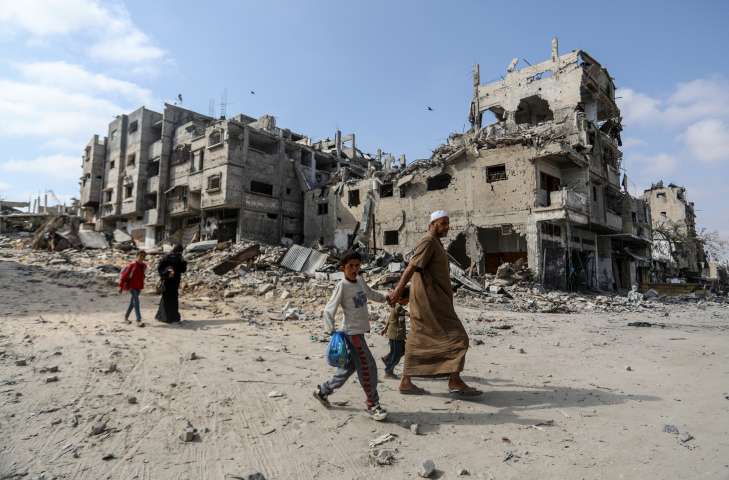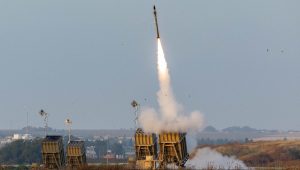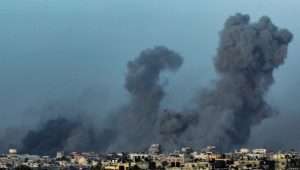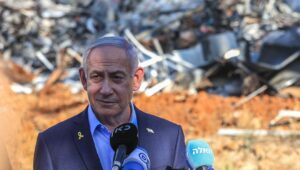At the end of November last year, I wrote an analysis titled “What to do with Gaza after the war?” in which I highlighted the various options for the future governance of Gaza that were already circulating at the time. Now that the war has reached an advanced stage, the question of who will govern Gaza after the Hamas regime is permanently removed has become acute, but there are several options, as we will see.
Israel is considering a situation in which the military administration of Gaza remains in the hands of the IDF so that there is complete freedom of action in the enclave.
The government in Jerusalem has vowed that Gaza will never again pose a threat to Israel, and sees the presence of the Israeli army in the enclave as the best guarantee that this will indeed be the case.
In this context, think of a structure that already exists in Judea and Samaria, where the IDF was given complete freedom of action after the events of the Second Intifada (2000-2004).
IDF forces raid Palestinian towns and villages when they have intelligence that a terrorist threat is developing there, thus keeping the overall situation more or less under control.
Attempts by Iran to transform Palestinian Authority-controlled areas into a second Gaza have led to an increase in terrorist attacks in Judea and Samaria, but a missile capability that local terrorist groups thought they could develop was made impossible by the presence of the IDF.
There is therefore clarity regarding the military administration of Gaza after the war, which will remain in the hands of the IDF.
Civil administration
The same cannot be said regarding civil governance, since there is already a dangerous vacuum that Hamas has repeatedly tried to fill.
In northern Gaza, for example, Hamas recently attempted to reestablish control over the lives of remaining residents, and this made new operations by the IDF necessary.
Israel believes that the best solution is for local officials who are not affiliated with Hamas or other terrorist groups to take over the administration of the Gaza Strip.
Local clans
At the end of February, Prime Minister Benjamin Netanyahu presented a one-page plan that primarily talked about measures that would guarantee Israel’s security.
The plan remained vague on civilian administration, and Netanyahu was later forced to clarify. The prime minister then spoke about local clans and tribes that could take over the civil administration of Gaza.
Indeed, discussions between Israeli officials and clan leaders in Gaza were reported sometime later. The talks with the clans were led by Druze General Ghassan Aliyan, the IDF Coordinator of Government Activities in the Territories (COGAT).
The problem with the clan idea, however, is that the clan leaders would immediately have to fear for their lives if they were to head the civilian administration of Gaza. Hamas can be defeated militarily in Gaza, but the jihadist group has many supporters who would certainly threaten the lives of the new rulers.
Palestinian state
Netanyahu’s ideas about the civilian administration of Gaza also do not correspond with those of influential foreign actors.
The United States still believes that a Palestinian state should be formed and that a revitalized Palestinian Authority should take over the administration of Gaza.
The role of Saudi Arabia
The administration of President Joe Biden also sees a role for Saudi Arabia in Gaza, which mainly concerns the financing of the reconstruction of the coastal strip, where approximately 70 percent of the houses have been destroyed or damaged.
Biden and Secretary of State Antony Blinken also believe that the path to a different future for Gaza runs through a normalization agreement between Israel and Saudi Arabia, and for this reason, Blinken has traveled to Israel six times since Oct. 7, almost always visiting Saudi Arabia as well.
Blinken’s seventh visit began on Tuesday, when he again traveled to Saudi Arabia to hold talks with the government of Crown Prince Mohammed Bin Salman before touching down in Tel Aviv for talks with Netanyahu on Wednesday.
Israelis oppose a Palestinian state
There are several problems with the US plans, however. First, there is strong resistance in Israel to the creation of a Palestinian state after the events of Oct. 7.
A recent opinion poll showed that 51 percent of the Israeli population is against a Palestinian state as part of a normalization deal with Saudi Arabia that will see the US guaranteeing quiet in the Gaza Strip.
An earlier survey that was published at the beginning of February and that excluded normalization with Saudi Arabia found that 68 percent of Israelis oppose the creation of a Palestinian state. This poll also showed that as many as 81 percent of the Israeli population (Arabs and Jews) do not believe the PA will change even if reforms are implemented.
Furthermore, within the current Israeli government, there is virtually no one who supports the idea of a Palestinian state. The same is true of the National Unity party of former IDF Chief of Staff Benny Gantz, which is seen as left of center and is leading in all current polls.
There is similarly almost zero support in Israel for the American idea of having a “reformed” Palestinian Authority administer the Gaza Strip in the short term.
Saudis still want normalization
Saudi Arabia, meanwhile, remains interested in normalizing relations with Israel, and talks with the US have continued despite the war in Gaza.
The government in Riyadh is closely monitoring developments in Israel and is interested in an Israeli victory over Hamas, not only because the Saudis hate the jihadist terror organization, but because they know Israel is waging a war against Iran, their common enemy.
The stumbling block in the normalization talks so far has been that Riyadh has proven to be unwilling to let go of the idea of a Palestinian state. Since the Biden administration still believes that a Palestinian state should be created, the idea of a Saudi role in the future governance of Gaza, as some in Israel propose, seems to be unrealistic.
Reeducating Gaza
The American plan also ignores another important aspect of the future of Gaza that is important to Israel, and that is a denazification process for the population of the enclave.
The civilians in Gaza have been exposed to brainwashing by Hamas for 17 years, and children have been raised on hate all this time. In Germany after the Second World War, it became necessary to educate the population in democracy and tolerance towards others. This is even more necessary in Gaza.
There is consensus in Israel on the need for a denazification process, and this is seen as an important part of the overall rehabilitation plan for Gaza.
Now that there are more and more civilians in Gaza who openly demonstrate a distaste for Hamas, it seems a good time to develop a plan for reeducation, but the question is who could lead this denazification process.
If Israel were to try to do this, it would encounter the problem that the radicalization of the population arose from the Hamas version of Islam that sees Jews as subhuman. Therefore, it would be better if reeducation would come from the Arab world.
Thinking differently about Israel
There are activists in Palestinian society who have been trying for some time to independently bring about a change in thinking about Israel. One of them is Rami Aman, a Palestinian journalist from Gaza who founded the Gaza Youth Committee in 2015.
Aman organized online video calls between Palestinians in Gaza and Israelis, and called this initiative ‘Skype with the enemy.’
The journalist was arrested by Hamas in 2020 and accused of undermining “the revolutionary spirit” in Gaza. Aman was released by Hamas after six months in prison.
Another Palestinian peace activist is Ali Abu Awad, who lives in the Hamas stronghold of Beit Umar north of the city of Hebron.
Awad founded the organization Taghyeer (Change) and promotes a peaceful solution to the conflict with Israel. The activist was once an active Fatah member and was convicted by Israel for throwing stones at Israeli motorists.
In prison, Awad underwent his own reform process when he saw that a hunger strike was more successful than the use of violence.
Even after his brother Yousef was shot dead by an IDF soldier, Awad continued to believe that revenge was not the answer.
So there are Palestinian Arabs who believe that there is a different path in relations with Israel, and they could play a role in the reforms that Gaza will have to undergo if life there is to take a different course.
















Palestinians share their ethnicity with Jordanians. They are, in effect, Jordanians that oppose a Jewish State. Therefore, Jordan’s counsel on the best way to rehabilitate Palestinians would be welcome. Jordan had to forcibly evict the Palestinians after the Black September coup of 1973 when they tried to take over Jordan. The methods they recommend may not be politically correct but they should be supported as they should have the goal of reintegrating Palestinians back into Jordanian not Israeli society.